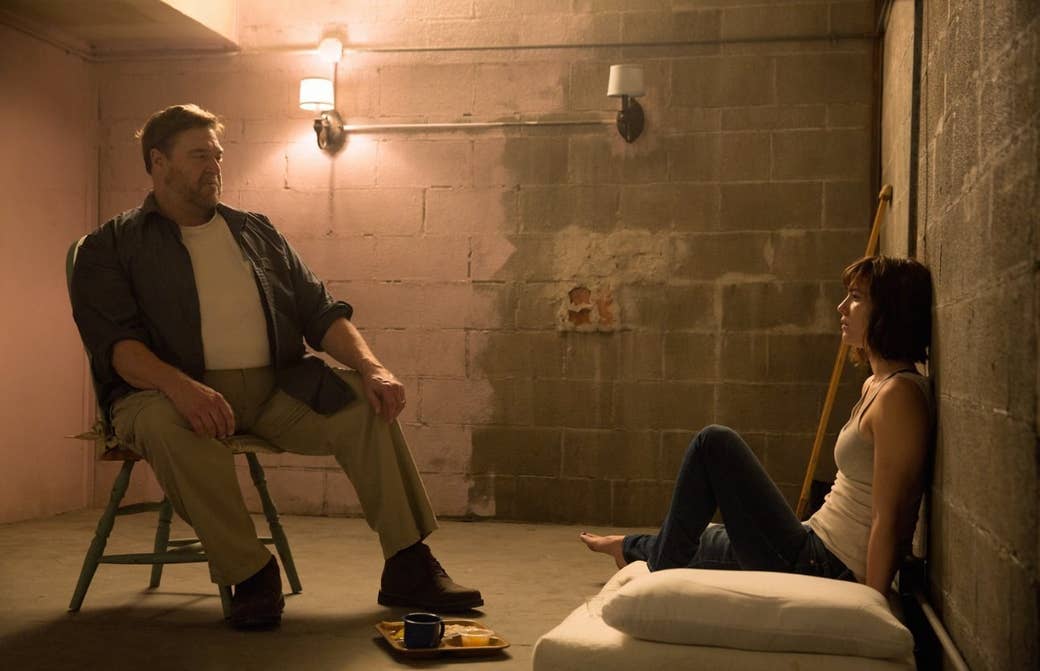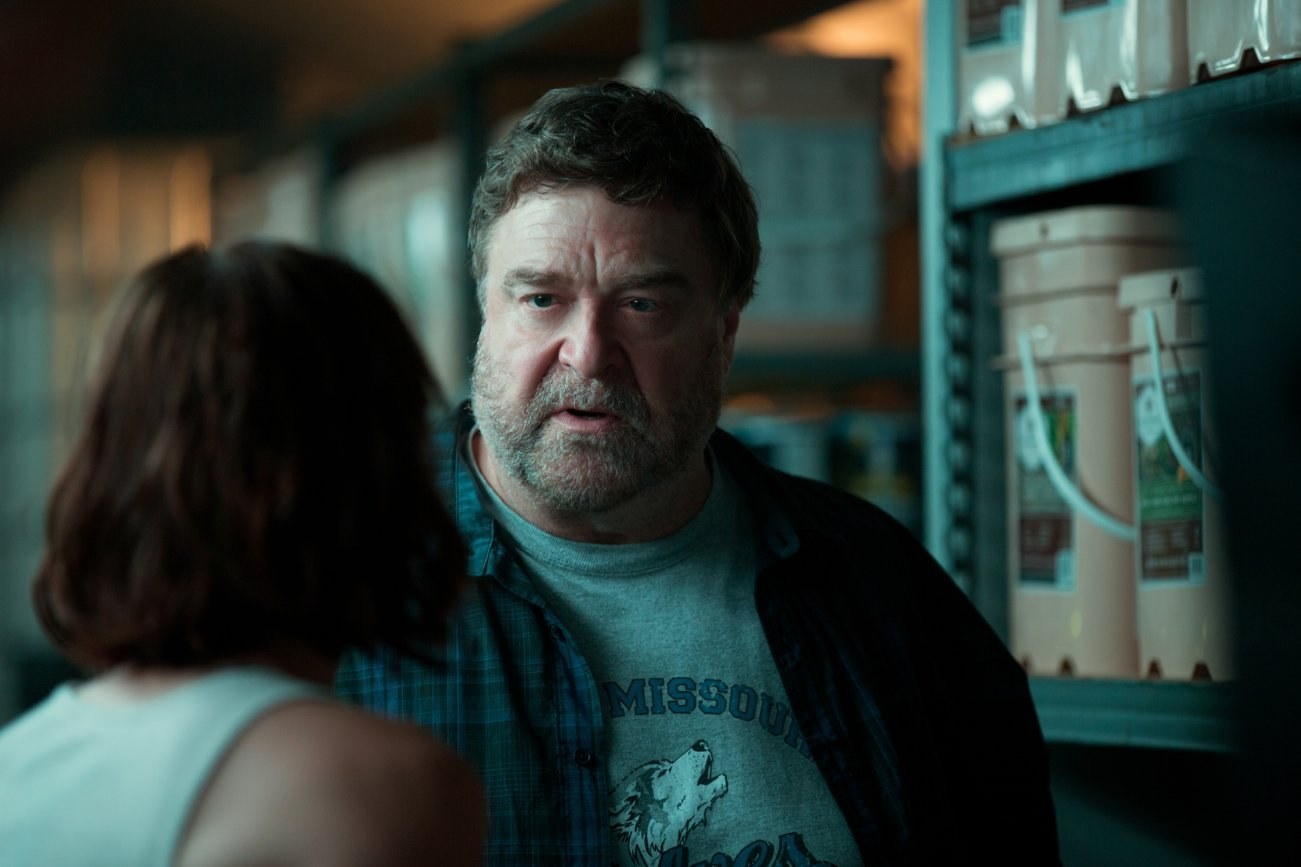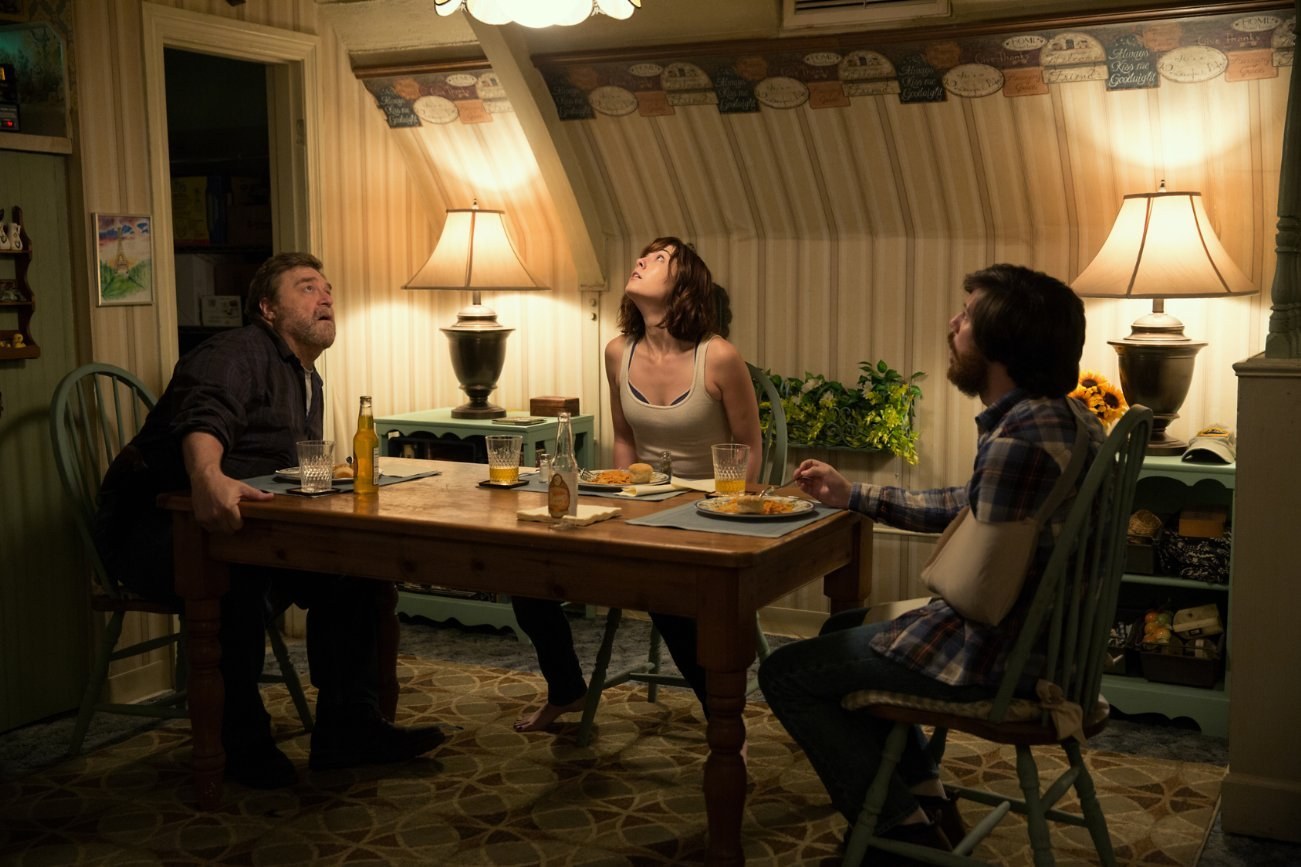
Cloverfield was a found footage film about a gargantuan, spindly limbed monster ravaging New York. The 2008 film was also, sidelong, a movie about 9/11 — not the causes or the consequences, but the visceral awfulness of being in the middle of an assault on the city, frantically trying to discern what's happening, where to run, and whether your loved ones are safe. Its shaky-cam style evoked the videos shot on the fly by eyewitnesses that have become our usual first look at disasters in the years since 2001. Its characters were just ordinary people who didn't defeat the creature, or figure out its origins, or make smart decisions in their attempts to stay alive. Cloverfield dealt in a recent American trauma the way its kaiju classic predecessor Godzilla evoked Japan's fears about nuclear weapons in the wake of World War II.

The monster in 10 Cloverfield Lane — a clever, modest thriller being positioned (a little cynically) as a sort of follow-up to that first film — offers a different kind of real-world resonance. The monster's name is Howard, and he's played with ominous conviction by John Goodman.
Howard is the man responsible for building the well-stocked bunker — a sterile, florescent-lit space filled with humbly homey trappings — in which most of the movie takes place. He's a former Navy guy and a current doomsday prepper who claims there's been some kind of major attack, and that everyone outside is dead. He insists that he's saved the lives of the two people he's taken in, and that it'll be at least a year or two until the fallout settles and it's safe to leave.
The big questions in 10 Cloverfield Lane are whether Howard is delusional or lying (not the same thing) in order to Kimmy Schmidt his two younger guests, and whether there really is trouble outside. Michelle (Mary Elizabeth Winstead) has plenty of reasons to doubt his trustworthiness. She's in the process of fleeing an unhappy relationship when she's sideswiped by a car on a quiet Louisiana road; when she wakes up, she finds herself chained to a wall in an unfurnished room in his shelter, informed by her apparent abductor Howard that the world has ended and that she's only alive thanks to him. Howard, who's held on to artifacts of his departed daughter like he's eager for a replacement, frees Michelle from her chains but not the bunker. She's down the hall from Emmett (John Gallagher Jr.), the only other resident, who's curiously unbothered by his living situation — because, as we soon learn, he not only chose but fought to come inside, for reasons that suggest Howard was right about at least a few things.

10 Cloverfield Lane — which was helmed by Dan Trachtenberg and (like Cloverfield) produced by J.J. Abrams — is a nimbly directed three-person show that often comes across like a very dysfunctional family drama, the characters falling or forcefully placed into the roles of father, daughter, and boy next door. However, it's the relationship between Michelle and Howard in which the armrest-clutching tension builds, falls, and builds again. Winstead is a remarkably present actor, and Michelle is established as a gratifyingly level-headed and aware character from the start: For example, in a pre-bunker moment, she cautiously eyes an approaching car while fueling up at a gas station — just like, you know, a real woman traveling alone at night would. The result is the rare thriller protagonist whose every decision feels reasonable even though the situation she's navigating is a mire of questionable truths and conflicting evidence (what are those rumblings overhead?) which leaves her constantly uncertain about what to believe.
And what to believe about Howard? As good a heroine as Winstead's Michelle is, it's really Goodman's character who sears through the movie, a combination conspiracy theorist and ironhanded host. 10 Cloverfield Lane positions Howard as an extremist who's quietly thrilled that the moment he's been preparing for has arrived, and that he has a captive audience to tell "I told you so." He's introduced through a rumbling down the hallway like a giant — fee-fi-fo-fum — while the camera focuses on his stomping feet first, then the gun on his hip, and then ultimately settles on his glowering face as Goodman plays up the slouching ballast of his body. He's the man who's been muttering about invasions all of his life, finally sure that he's been proven right, a petty tyrant tending his windowless domain with a self-satisfied air, ordering Emmett and Michelle down to dinner and dictating appropriate conversation for the table.

Like the resentful outcast Kylo Ren in The Force Awakens, or super-powered men's rights activist Kilgrave from Jessica Jones, Howard comes across as a warped, mutated version of someone who crawled off a Twitter block list. He's a paranoid, don't-tread-on-me nightmare, the concentrated embodiment of the sentiment that "they" are coming for us (and in Howard's case "they" could be anything from the Russians to the Martians) and that everyone who hasn't been stockpiling goods and weapons deserves what they get. "You people," he sneers at Michelle when he senses that she thinks he's crazy. "Crazy is when you build your ark after the floods have already come." Howard hasn't just been preparing for Armageddon but longing for it to come along and prove him both right and necessary, the unquestioned king of the underground lair he's built for himself. He reminds Emmett and Michelle repeatedly that they owe him gratitude, and when Michelle does thank him, he can't help but break into a self-satisfied smile — one of Goodman's more chilling choices.
Long before 10 Cloverfield Lane gets to the issue of whether or not there are monsters above ground, it's evident that Howard is monster enough below it: a figure of frustrated, resentful masculinity (he alleges, offhand, that his ex-wife turned his daughter against him) finally crowned with the authority he feels has long been denied him. While the original Cloverfield deliberately positioned its cast of twentysomethings to be dwarfed by a largescale disaster, 10 Cloverfield Lane is rewardingly claustrophobic, keeping its focus tight on the characters and their cramped space while whatever disasters there are loom outside the bunker. Inside of it is someone who is sure he's just been handed the ultimate proof that he knows what's best for everyone — and he has a gun. Given that reality, who wouldn't start to think about making a run for it, even if there may be nowhere safe left to go?
